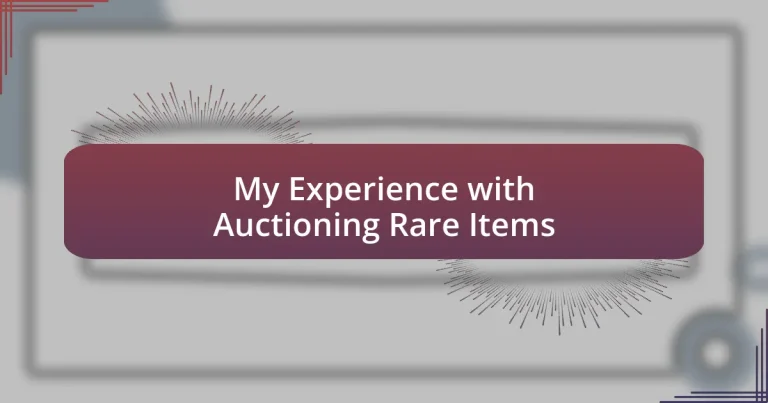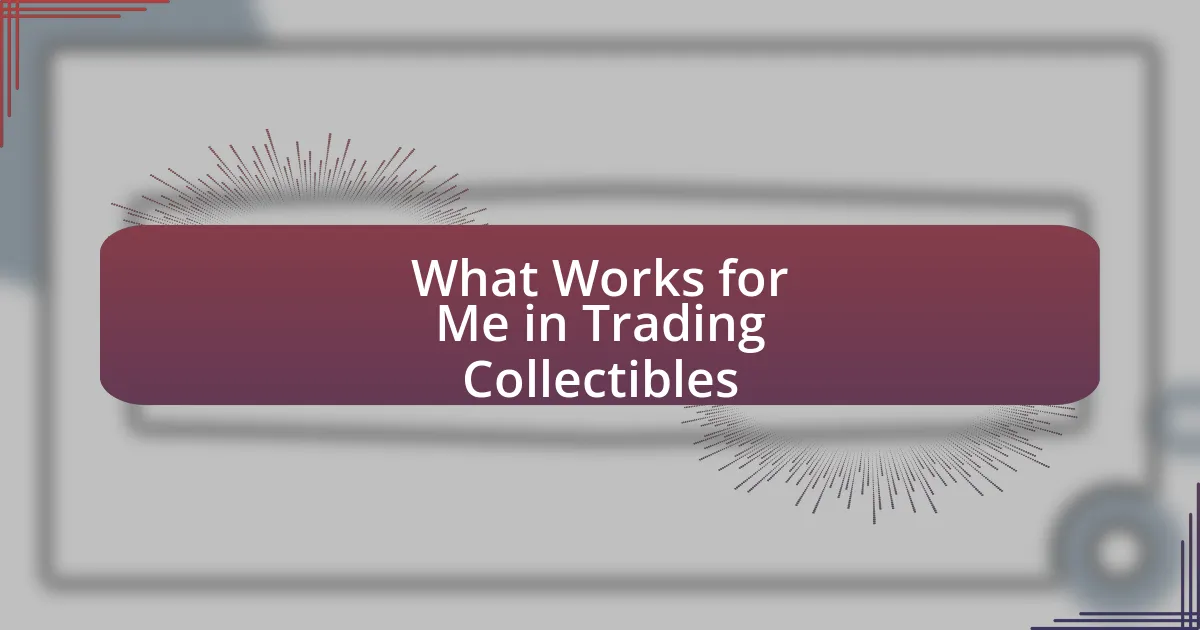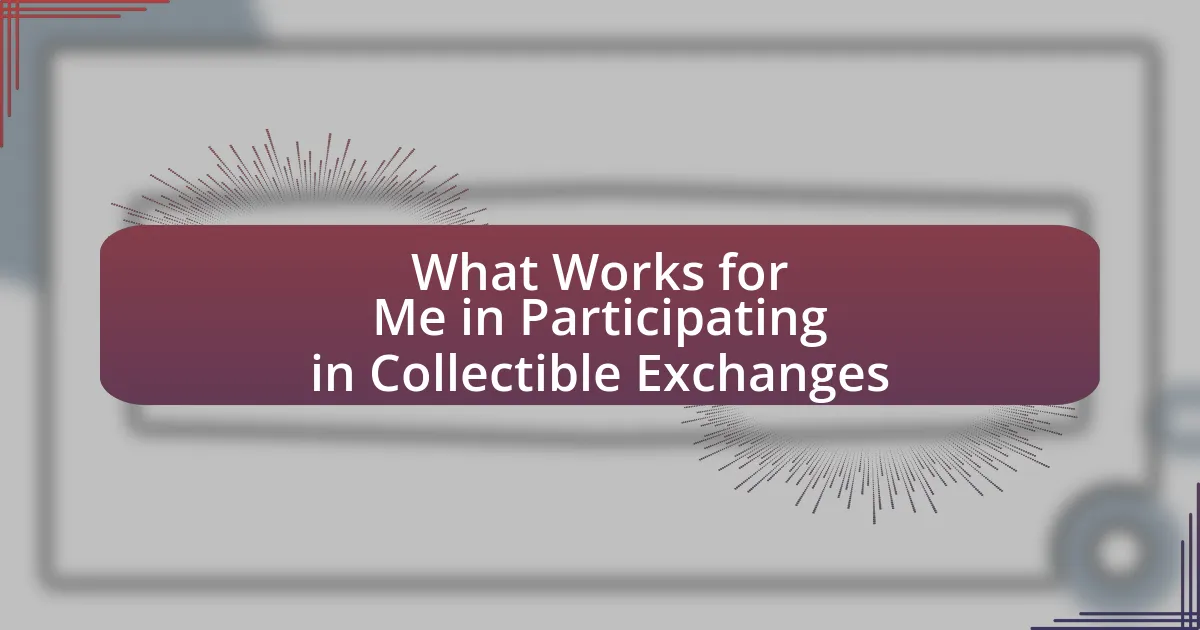Key takeaways:
- The auction experience is enriched by understanding the history and condition of rare items, which can significantly influence bidding behavior.
- Choosing the right auction house involves considering factors like specialization, reputation, fees, and customer service to enhance the auction outcome.
- Effective bidding strategies include setting a budget, observing competitors’ behaviors, and utilizing proxy bidding to navigate the auction dynamics successfully.
- Post-auction responsibilities such as payment arrangements, shipping, and understanding tax implications are crucial for a smooth transaction process.
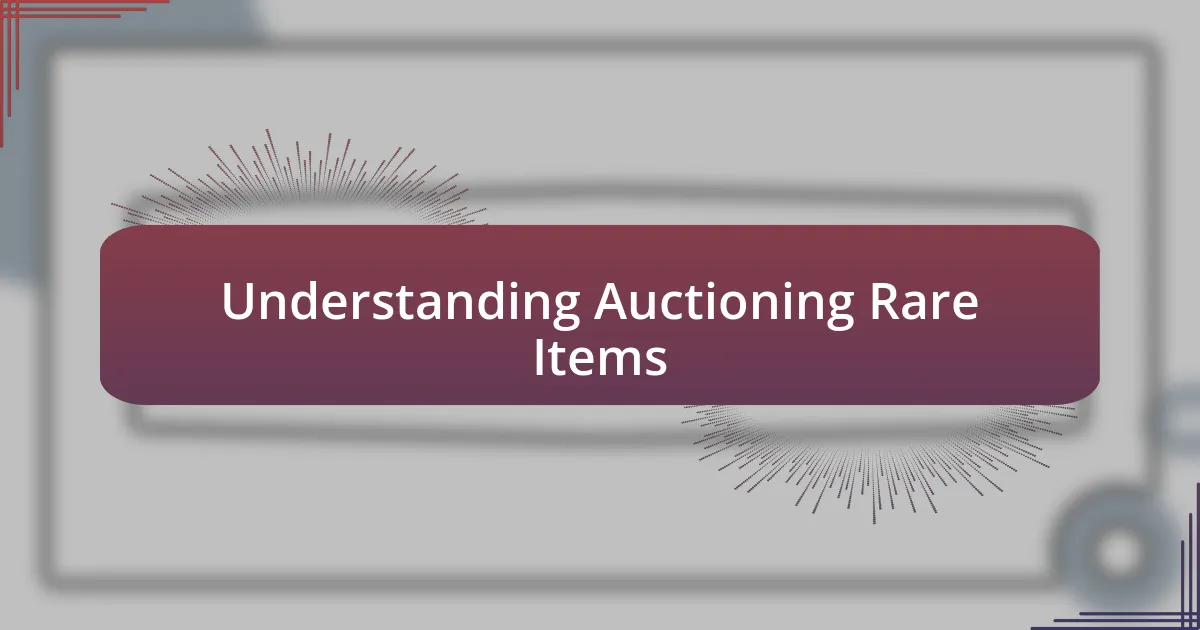
Understanding Auctioning Rare Items
Auctioning rare items can be an exhilarating experience. I remember the first time I walked into an auction house, the air thick with anticipation. Have you ever felt that rush as the gavel comes down? It’s a moment that combines tension and thrill, and understanding the dynamics of auctioning is crucial to making the most of it.
Rare items often come with a fascinating backstory that adds to their value. For instance, when I once bid on a vintage guitar, I learned about its previous owner—a famous musician. Knowing its history gave me not just the desire to own it, but a deeper appreciation for what I was about to bid on. Isn’t it amazing how stories can amplify the allure of an item?
Moreover, the auction environment is a unique blend of strategy and emotion. As you observe seasoned bidders, you realize that each bid can tell a story—from the confident gestures of those who know what they want to the nervous fidgeting of newcomers. Have you thought about how your own emotions can influence your bidding strategy? It’s something I’ve had to navigate; understanding that can significantly impact your auction experience.
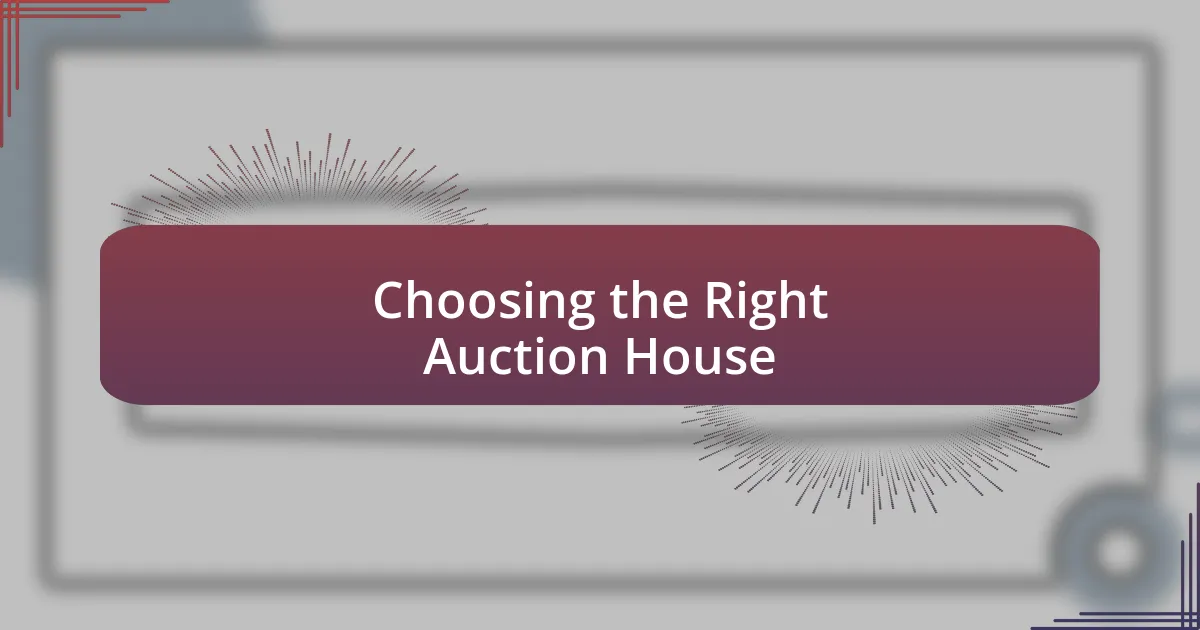
Choosing the Right Auction House
Choosing the right auction house is crucial when you’re diving into the thrill of bidding on rare items. From my experience, I’ve learned that not all auction houses are created equal. Some specialize in certain types of collectibles, while others might attract a more general audience. When I was looking to auction off a signed baseball, I opted for a house renowned for sports memorabilia. The atmosphere was charged, and it made a world of difference in the bidding outcomes.
Here are a few key factors to consider when selecting an auction house:
- Specialization: Look for auction houses that specialize in the category of items you’re interested in.
- Reputation: Research their track record and read reviews. A reputable house can boost buyer confidence.
- Fees: Be aware of any commissions or hidden fees that may cut into your final sale price.
- Marketing Strategies: Inquire about how they promote their auctions; effective marketing can lead to higher bids.
- Customer Service: Ensure the staff is knowledgeable and can guide you through the auction process.
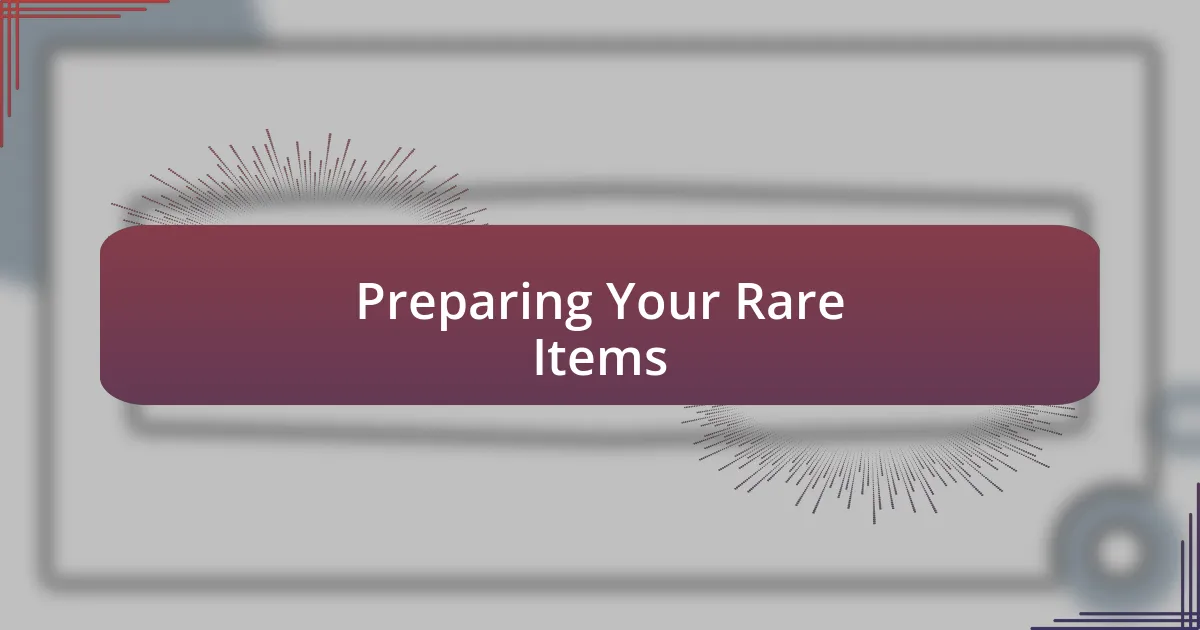
Preparing Your Rare Items
Preparing your rare items for auction is an essential step that can significantly impact your final sale price. In my experience, I found that thorough preparation not only elevates the item’s appeal but also builds buyer confidence. For instance, when I was ready to auction a vintage comic book, I took the time to clean it gently and replace the worn-out cover. This small effort transformed it, and the bidders took notice.
Condition is everything when it comes to rare items. I’ve learned that potential buyers are often swayed by how well an item is preserved. As a collector, I remember nervously scrutinizing my old coins, ensuring each one shone brightly for the preview. I discovered that even a little polish could enhance their features and draw attention during the auction.
Lastly, documenting provenance is crucial. Buyers tend to pay a premium for items with an interesting backstory. I recall a time when I auctioned a signed first edition book; I gathered every receipt and personal letter related to its history. This detailed narrative not only made the item more compelling but also increased my final bids significantly.
| Preparation Aspect | Importance |
|---|---|
| Condition | Enhances appeal and value |
| Documentation | Boosts buyer confidence and interest |
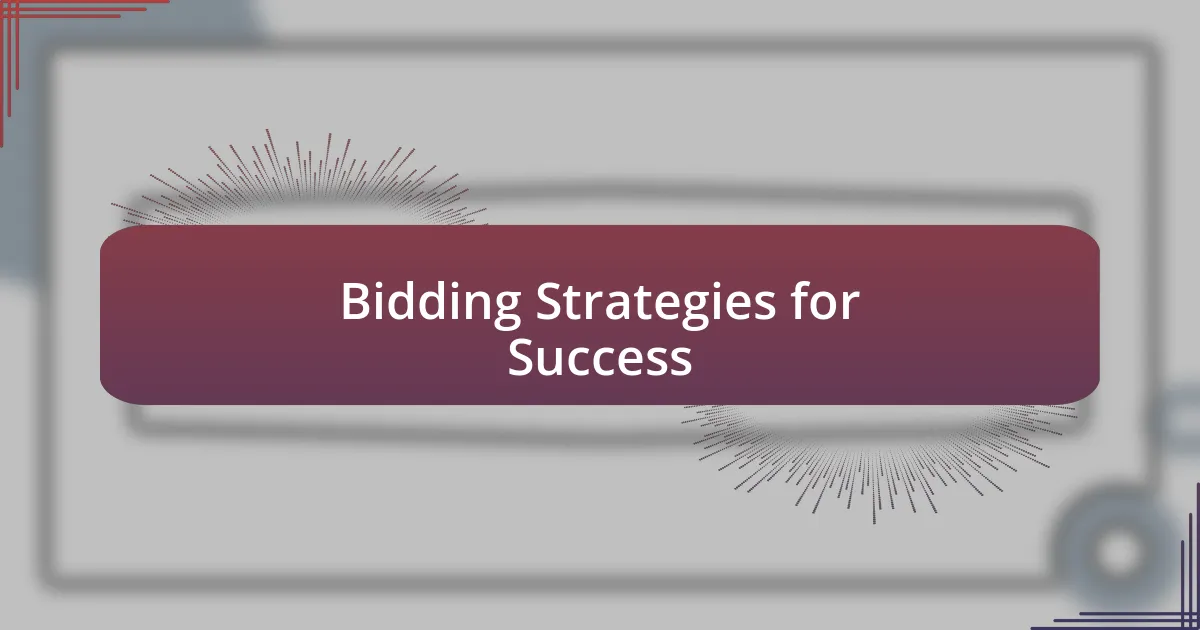
Bidding Strategies for Success
When it comes to bidding strategies, I’ve found that setting a clear limit before the auction starts is invaluable. It’s all too easy to get swept up in the excitement and exceed your budget. I remember a tense auction where I went over my limit for a rare vinyl record I desperately wanted; while I eventually secured it, I learned a vital lesson about sticking to my financial guns.
Another effective strategy is to observe the bidding patterns of other participants. During one memorable auction, I noticed that many bidders would hesitate after reaching a certain price threshold. Timing my bids to take advantage of these pauses allowed me to secure items without facing intense competition. If you can gauge when your competitors are starting to feel the pinch, you can make smarter moves.
I also recommend employing the power of the proxy bid feature if the auction platform offers it. I once utilized this method for a rare vintage watch; I set my maximum price and let the system do the heavy lifting. This not only calmed my nerves but also ensured I didn’t miss out on the item while second-guessing myself. Have you ever felt that rush of adrenaline while bidding? Marrying emotion with strategy can make all the difference in your auction experience.
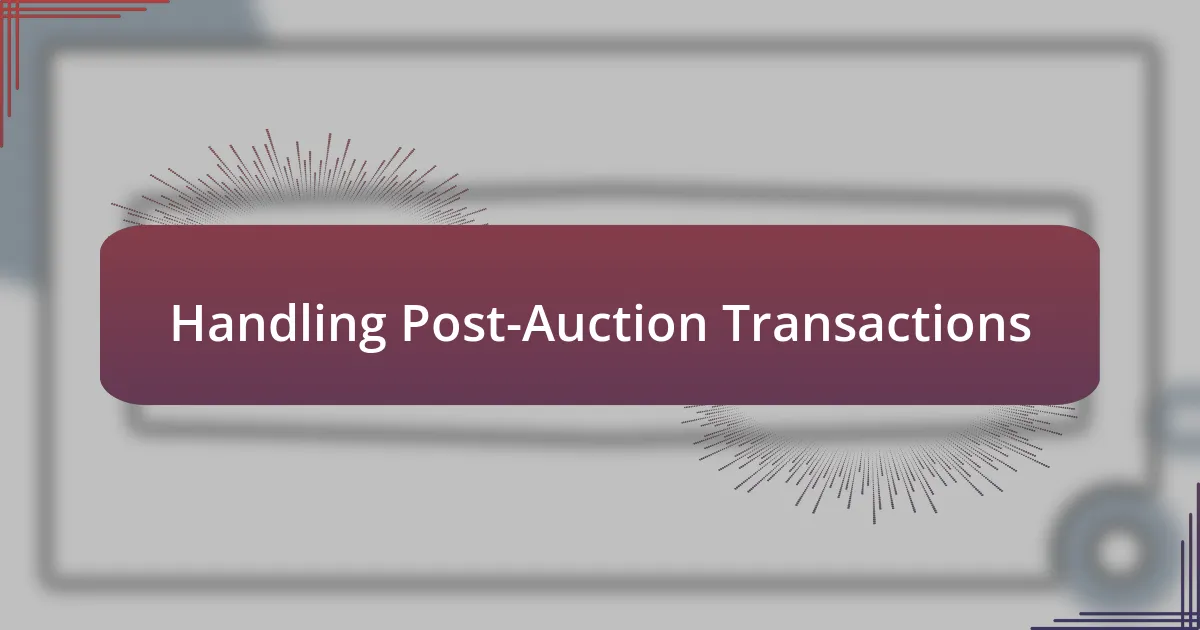
Handling Post-Auction Transactions
Once the auction draws to a close, handling post-auction transactions is where the real work begins. I remember the first time I won a coveted art piece; the excitement faded when I realized I had to arrange payment, shipping, and insurance. Each step is crucial, and I learned that communicating promptly with the seller can pave the way for a smooth transaction. Have you ever felt that moment of panic when realizing the responsibility that comes with winning a bid?
Payment methods can vary from one auction house to another, so it’s important to choose one that feels secure and comfortable. In my experience, I often opt for a credit card to benefit from buyer protection. There was an instance where a seller claimed they didn’t receive my payment, but I was able to provide proof from my bank. This highlighted the importance of keeping records of all transactions.
When it comes to shipping, I strongly believe in finding a reputable service that specializes in handling fragile or high-value items. For example, the last rare collectible I purchased needed extra care during transport. I tracked it obsessively until it arrived safely at my doorstep, proving that, while the bidding excitement is thrilling, the true value often lies in the details of the acquisition process. Don’t you think it’s the careful handling of these items that makes them feel truly special?
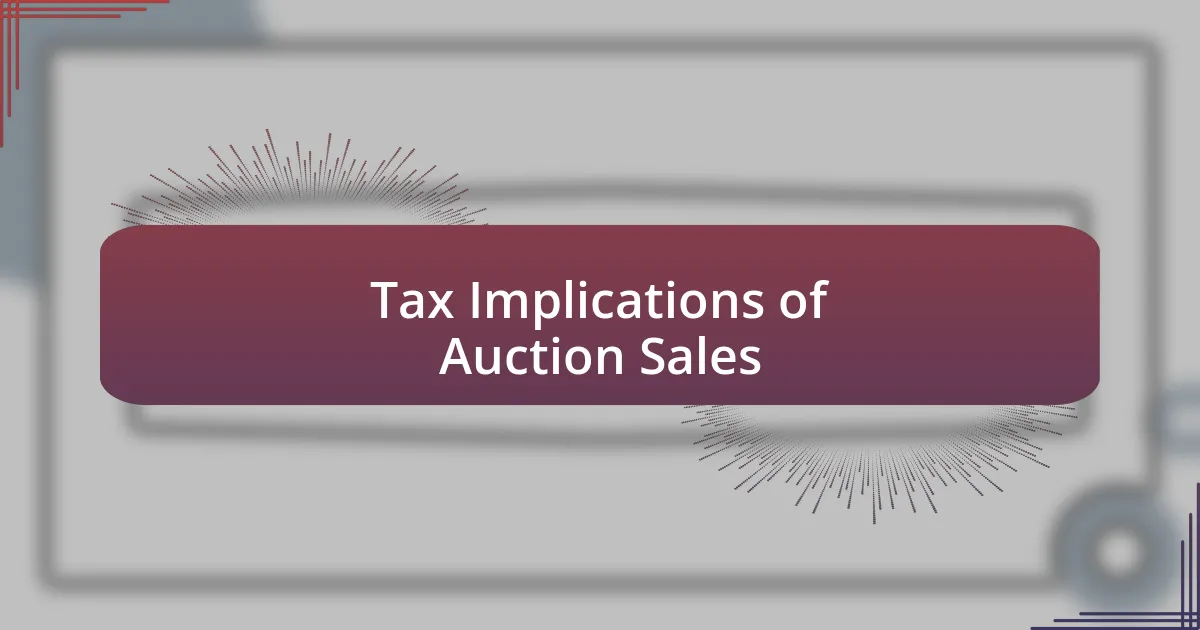
Tax Implications of Auction Sales
Navigating the tax implications of auction sales can be surprisingly intricate. I still vividly recall the moment after winning my first significant purchase at an online auction; I was elated until I remembered the potential tax liabilities. Depending on where you live, you might be liable for sales tax, which can add a considerable amount to your final costs. Have you ever thought about how these hidden charges can reshape your budgeting for that dream item?
When I sold a vintage watch at auction last year, I learned firsthand about capital gains tax. Since the watch appreciated in value over time, the profit I made was subject to taxation, which I hadn’t initially anticipated. I had to account for the cost basis, which means I subtracted what I originally paid for the watch from the selling price. That experience taught me the importance of thorough record-keeping during the buying and selling processes. How prepared are you when it comes to the financial consequences of your auction activities?
It’s also essential to consult with a tax professional if you’re dealing with high-value items or a more extensive collection. I once tried to navigate this complex landscape on my own, only to realize I had overlooked key deductions. Having a knowledgeable advisor helped me understand what I could claim and ensured that I wasn’t leaving money on the table. So, have you considered the difference expert guidance can make in managing the financial side of auctioning?

